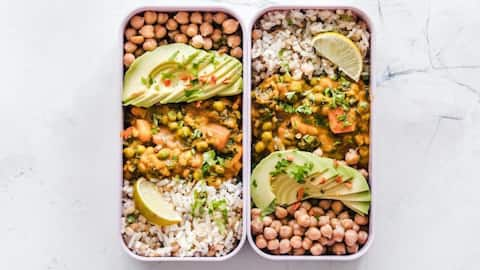5 vegan essentials for muscle gain
What's the story
When it comes to building muscle on a vegan diet, strategic food choices become pivotal in providing essential nutrients for optimal growth and recovery.
Contrary to the misconception that muscle gain requires animal protein, a well-planned vegan diet can offer the right combination of protein, carbohydrates, and fats.
Here are five vegan items that can be integral to your journey of gaining muscle mass.
Lentils
Legumes: Power-packed protein source
Legumes such as lentils, chickpeas, and black beans are excellent sources of plant-based protein. Packed with essential amino acids, legumes provide the building blocks necessary for muscle repair and growth. Incorporate legumes into salads and curries.
They are a great source of complex carbohydrates, offering a sustained release of energy. This is beneficial for maintaining energy levels during workouts and supporting overall physical performance.
Nuts
Nuts and seeds: Healthy fats and protein combo
Nuts and seeds, such as almonds, chia seeds, and pumpkin seeds, offer a nutrient-dense combination of healthy fats and protein.
These snacks can contribute to your overall caloric intake, crucial for muscle growth.
Additionally, they provide essential omega-3 fatty acids and micronutrients crucial for overall health. Sprinkle them on salads, yogurt, smoothies or enjoy them as a standalone snack for added nutritional benefits.
Protein powders
Plant-based protein powders
Derived from various plant sources, these powders provide a convenient and versatile way to boost protein intake.
Brown rice, soy, chickpea, greenpeas can be used to prepare plant based protien powders. They often come with additional nutrients such as fiber, antioxidants, and essential fatty acids, contributing to overall nutritional value.
Also, they are free from allergens making them suitable for individuals with lactose intolerence.
Quinoa
Quinoa
Often referred to as a "complete protein," quinoa is a seed that stands out for its amino acid profile. While it is not a true cereal grain, quinoa contains all nine essential amino acids, making it a valuable protein source for plant-based diets.
Rich in fiber, iron, magnesium, and other essential nutrients, quinoa is a versatile grain that can meet protein requirements.
Vegetables
Green leafy vegetables
Spinach, broccili, asparagus, and kale stand out as some of the most nutrient-dense leafy green vegetables, offering a considerable protein content.
While vegetables may not boast high protein content when compared to certain other foods, numerous varieties contain significant protein relative to their calorie content which is an excellent strategy to enhance both the protein and nutrient density of your diet without increasing weight.
